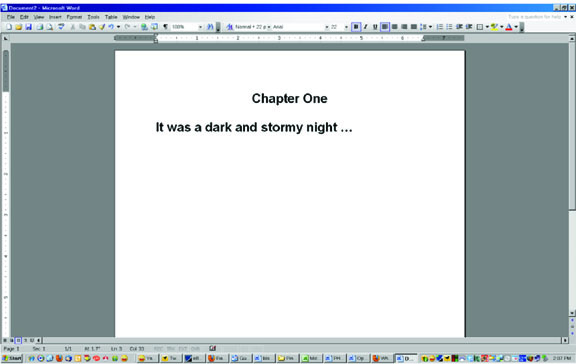Beginnings
Terry Odell
 Book beginnings are tough, as evidenced by the interest in The Kill Zone’s First Page Critiques. A blog post I’d read recently talked about having about 250 words to ‘hook’ a reader. That’s not even a full page.
Book beginnings are tough, as evidenced by the interest in The Kill Zone’s First Page Critiques. A blog post I’d read recently talked about having about 250 words to ‘hook’ a reader. That’s not even a full page.
And, it seems, no matter how many books we’ve written, how many times we’ve stared at that cursor on the screen under the words “Chapter One”, it doesn’t get easier.
I know this is a frequent topic her at the Zone, but it hit home (again) as both myself and my critique partner were starting new projects. And, we both were falling into the same old quicksand. She’s more of a planner than I am, and she was starting a new series, so her head was filled with ideas, many of which would fall into the “tell us this later” category. Her first chapter was full of them.
I was going back to my Mapleton Mystery series, so I know most of my main characters. But there were things from the last book that readers might need to know, threads that were left open. Not dangling, not hanging onto cliffs, just springboards to explore in a future book. If you’re interested, I posted an article about endings on my personal blog Monday.
Even “knowing the rules”, when I shared my first draft of page 1 of a new book, a draft I’d set aside to deal with final edits and formatting of Cruising Undercover, an author friend pointed out that my first paragraph was … exposition. In my mind, there was a conflict there, a problem, but there I went, letting my protagonist think about it.
Open with Dialogue. Dialogue is Action.
How many times have I “heard” James Scott Bell and others here pound that advice into us? More than I can count, yet, even knowing this, understanding this, I was so eager to describe the problem so that’s what I did.
This was my opening draft paragraph:
Gordon Hepler held his breath as Angie, his wife, stepped into the house he’d hoped she’d approve of. Not that he didn’t love her—to the moon and back—but her tiny apartment above the Daily Bread diner she ran was … tiny. She’d agreed to consider moving, but so far, she’d found fault with every house they’d looked at. This one—fingers crossed—would meet her criteria. Except for one minor wrinkle, it was perfect.
There was a line of dialogue immediately after this paragraph, but no, I hadn’t opened with it, not to mention loading the paragraph with back story.
Back to that blog post. The author suggested 7 points that should hook readers, and that authors should strive for 4 of them in their first 250 words. Rather than repeat what the contributors to TKZ say in their First Page Critiques, I’m going to open the floor to discussion. Do you agree with these 7 hooks?
- Plunge into the action
- Communicate a theme
- Raise a question that needs answering
- Hook the reader’s emotions
- Communicate the stakes
- Establish tone/voice
- Introduce the main character (if possible, by name)
Do you think squeezing 4 of them into half a page is effective? Obviously several can be combined (avoid the laundry list!), but 250 words isn’t much real estate to deal with.
And if you want to read the full article, which contains examples, it’s here.
Floor’s yours.
 Now Available for Pre-Order: Cruising Undercover.
Now Available for Pre-Order: Cruising Undercover.
Not accepting the assignment could cost him his job. Accepting it could cost him his life.
 Terry Odell is an award-winning author of Mystery and Romantic Suspense, although she prefers to think of them all as “Mysteries with Relationships.”
Terry Odell is an award-winning author of Mystery and Romantic Suspense, although she prefers to think of them all as “Mysteries with Relationships.”
